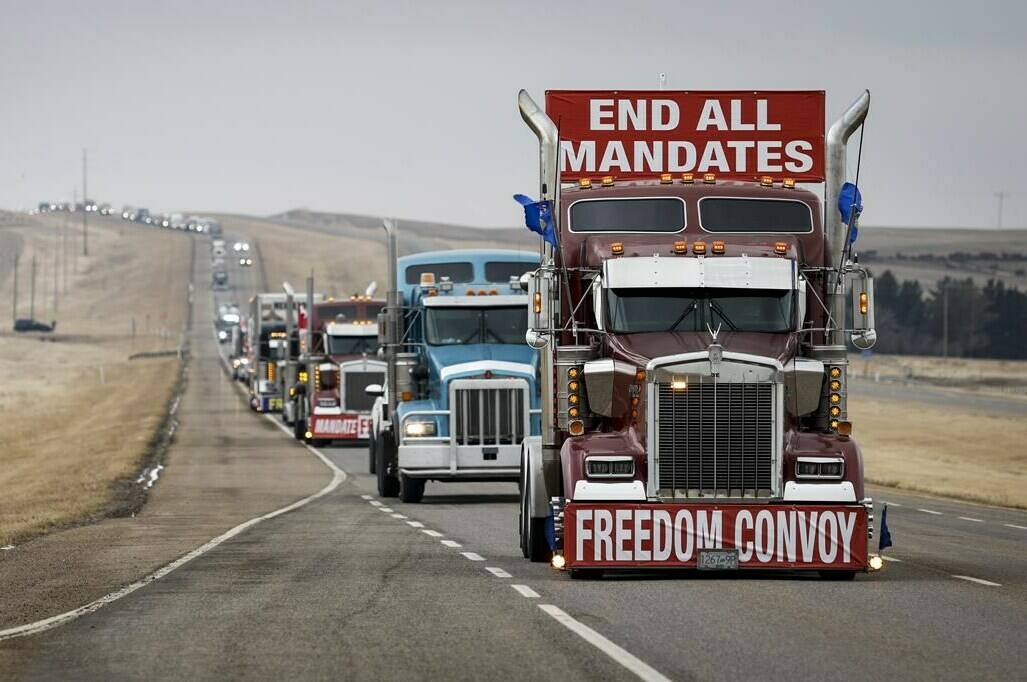A blockade that paralyzed a United States border crossing for more than two weeks ended Tuesday as trucks and other vehicles with horns blaring rolled away from a southern Alberta community.
Protesters had been restricting access to the busy crossing near Coutts since Jan. 29 to rally against COVID-19 vaccine mandates for truckers and broader pandemic health restrictions.
Canada Border Services Agency said operations had resumed at the crossing and RCMP confirmed later Tuesday that traffic was moving smoothly.
The exodus of vehicles came one day after RCMP arrested 13 people and seized a cache of firearms and ammunition.
Charges laid include possession of weapons and mischief to property.
Four people also face a charge of conspiracy to murder RCMP members, said Chief Supt. Trevor Daroux. He said police worked closely with the Crown to ensure they had the necessary evidence to lay those charges.
Some of the accused were granted release in a Lethbridge, Alta., courtroom on Tuesday. A judge also ordered that they can’t contact one another or be within a 200-metre radius of any protest.
Mounties said an early-morning raid Monday uncovered 13 long guns, handguns, a machete, a large quantity of ammunition and body armour. Two additional weapons were seized later in the day.
RCMP also said a semi-truck and farm tractor had attempted to ram a police cruiser on Sunday.
“The dangerous criminal activity occurring away from the TV cameras and social media posts was real and organized,” said Deputy Commissioner Curtis Zablocki on Tuesday evening.
“It could have been deadly for citizens, protesters and officers.”
Daroux said the RCMP became aware of the heavily armed group a few days after the protest began. He said investigations are ongoing into this group and other events that took place during the blockade.
“Alberta RCMP will remain in the area until we are confident that the situation is safe and stabilized for all who travel through here,” he said.
Protesters are dissociating themselves from the group of people facing serious charges. Organizer Marco Van Huigenbos said that is why the convoy decided to leave peacefully.
He said he has no regrets about participating in the blockade.
“I think we’ve started a movement where people are going to get more involved … at the municipal level, provincial possibly, but also more involvement in politics in general.”
Two tactical vests seized by the RCMP had badges on them, which the Canadian Anti-Hate Network said have links to troubling movements.
One vest had a “Diagolon” patch on it, a white diagonal line across a black rectangle, that is linked to an often conspiratorial and antisemitic group, said Peter Smith from the network. He said the group often talks about a soon-approaching civil war.
“(Their) rhetoric is very violent,” said Smith. “One of the, kind of, common phrases used within the community is ‘A gun or rope?’”
The other patch said “Infidel” in both English and Arabic in yellow. Smith said the patch doesn’t indicate membership to a specific network but is known among Islamophobic militias and biker-style hate groups.
He said the biggest worry is having niche extremist networks that could work to inflame supporters linked to what was supposed to be a peaceful protest.
There was celebrating when the protest started winding down late Monday. A video posted to social media showed RCMP members shaking hands with and hugging protesters. People holding hats or hands to their chests or with arms draped across each other’s shoulders sang O Canada.
Cpl. Gina Slaney confirmed the scene was from Monday night in Coutts.Zablocki said RCMP is aware of the video.
“I will say, we do encourage our members to engage with the public and develop respectful, professional relationships with all Albertans,” said Zablocki. “We will be looking further into this matter.”
Jim Willett, mayor of the village of 250 people, said it had been a while since he had seen anything but semi-trailers on Highway 4.
“I can see all the way to Regina,” he said with a laugh.
Willett said he doesn’t blame the blockade leaders for the cache of weapons.
“They were a well-behaved bunch of people,” he said. “I think the organizers were taken aback as much as we were by what the RCMP discovered.”
The number of protesters at a police checkpoint, north of Coutts, had also dwindled and work was underway to start clearing away a first-aid trailer, a sauna and electric generators.
“Last night, emotions were high … I think a lot of people felt that we were giving up, but we’re not giving up,” said John Vanreeuwyk, a feedlot operator from Coaldale, Alta., also a protest organizer.
“Is it a victory? No. A victory means we’re done,” he said.
The blockade was one of several demonstrations in Canadian cities and border points that stalled trade, stranded travellers and disrupted lives of area residents, particularly in Ottawa.
Deputy Prime Minister Chrystia Freeland has said $48 million in trade was lost each day that the Coutts border was closed.
—Bill Graveland, The Canadian Press
RELATED: Blockade ends at Alberta-U.S. border crossing after more than two weeks

